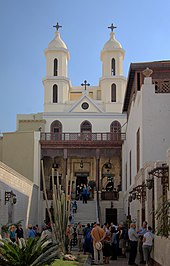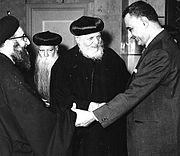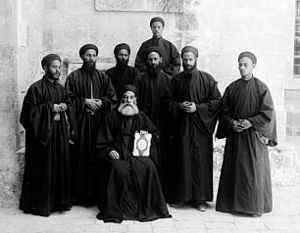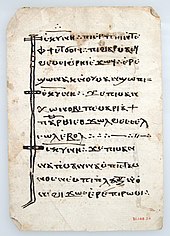Copts
Following the Muslim conquest, the treatment of the Coptic Christians who refused to convert ranged from relative tolerance to open persecution.[27][28][29][30] Historically, the Copts suffered from "waves of persecution giving way to relative tolerance in cycles that varied according to the local ruler and other political and economic circumstances".[38] The English language adopted the word Copt in the 17th century from Neo-Latin Coptus, Cophtus, which derives from the Arabic collective qubṭ / qibṭ قبط "the Copts" with nisba adjective qubṭī, qibṭī قبطى, plural aqbāṭ أقباط; Also quftī, qiftī (where the Arabic /f/ reflects the historical Coptic /p/) an Arabisation of the Coptic word ⲁⲓⲅⲩⲡⲧⲓⲟⲛ aiguption (Bohairic) or ⲕⲩⲡⲧⲁⲓⲟⲛ kuptaion (Sahidic).Although integrated in the larger Egyptian nation state, the Copts have survived as a distinct religious community forming around 5 to 20 percent of the population.[46] According to ancient tradition, Christianity was introduced to present day Egypt by St. Mark in Alexandria, shortly after the ascension of Christ and during the reign of the Roman emperor Claudius around 42 AD.Saint Jerome, who translated the Bible into Latin, came to Egypt while en route to Jerusalem around 400 AD, leaving details of his experiences in his letters.[54] Victor J. Katz notes that "research in papyri dating from the early centuries of the common era demonstrates that a significant amount of intermarriage took place between the Greek and Egyptian communities".In addition, the most prominent figure of the council was the future Patriarch of Alexandria Athanasius, who played the major role in the formulation of the Nicene Creed, recited today in most Christian churches of different denominations.One of the council's decisions was to entrust the Patriarch of Alexandria with calculating and annually announcing the exact date of Easter to the rest of the Christian churches.[71] Under Muslim rule, Christians paid special taxes, had lower access to political power, and were exempt from military service.Some prominent Coptic thinkers from this period are Salama Moussa, Louis Awad and Secretary General of the Wafd Party Makram Ebeid.In 1952, Gamal Abdel Nasser led some army officers in a coup d'état against King Farouk, which overthrew the Kingdom of Egypt and established a republic.[citation needed] The previous head of the Coptic Orthodox Church, Pope Shenouda III of Alexandria, died 17 March 2012.His name was selected from a glass bowl containing the three shortlisted candidates by a blindfolded boy at a ceremony in Cairo's St Mark's Cathedral.The Anglo-Egyptian invasion in 1898 allowed Copts greater religious and economic freedom, and they extended their original roles as artisans and merchants into trading, banking, engineering, medicine, and the civil service.However, when the National Islamic Front overthrew the elected government of Sadiq al-Mahdi with the help of the military, discrimination against Copts returned in earnest.[90] In contrast with the extensive media broadcasting of the Muslim Friday prayers, the radio ceased coverage of the Christian Sunday service.[91] However, a military coup in 2019, led by Abdel Fattah al-Burhan and Mohamed Hamdan Dagalo, dissolved the council and halted the democratic transition; Christians, including Copts, were subjected to intensified persecution during a civil war that began in 2023.[93] Living in countries with Muslim majorities (Egypt, Sudan, Libya), the size of the population of Copts is a continuously disputed matter, frequently for reasons of religious jealousy and animosity.From 2011 to 2015, during the Libyan civil war, at least 200,000 Christians fled Libya; during that time, Islamist militants such as the Ansar al-Sharia, Nusra Front, and Islamic State violently persecuted Copts.Hence a doublet of قبطي (ʔibṭi) and in fact the more native form, but apparently adopted by the Arabs in a mocking manner and is still used today by racists in Egypt.[127] However, many Copts continue to complain of being minimally represented in higher positions in law enforcement, state security and public office, and of being discriminated against in the workforce on the basis of their religion.[132] In 2007, a Cairo administrative court denied 45 citizens the right to obtain identity papers documenting their reversion to Christianity after converting to Islam.[133] However, in February 2008 the Supreme Administrative Court overturned the decision, allowing 12 citizens who had reverted to Christianity to re-list their religion on identity cards,[134][135] but they will specify that they had adopted Islam for a brief period of time.[136] In August 2013, following the 3 July 2013 coup and clashes between the military and Morsi supporters, there were widespread attacks on Coptic churches and institutions in Egypt by Sunni Muslims.[140] The Facebook page of the Muslim Brotherhood's Freedom and Justice Party was "rife with false accusations meant to foment hatred against Copts".[143] In April 2010, a bipartisan group of 17 members of the U.S. Congress expressed concern to the State Department's Trafficking in Persons Office about Coptic women who faced "physical and sexual violence, captivity ... exploitation in forced domestic servitude or commercial sexual exploitation, and financial benefit to the individuals who secure the forced conversion of the victim.[154] Maternally, Hassan (2009) found that Copts in Sudan exclusively carry various descendants of the macrohaplogroup N. This mtDNA clade is likewise closely associated with local Afroasiatic-speaking populations, including Berbers and Ethiopid peoples.[156] A 2015 study by Dobon et al. identified an ancestral autosomal component of Western Eurasian origin that is common to many modern Afroasiatic-speaking populations in Northeast Africa.In their analysis, Sudan's Copts formed a separated group in the PCA, a close outlier to other Egyptians, Afro-Asiatic-speaking Northeast Africans and Middle East populations.











Egyptian ArabicSaʽidi ArabicLiterary ArabicCopticCoptic Orthodox ChurchCoptic Catholic ChurchArchitectureCalendarCoptologyFastingHistoryIdentityToponymyLanguageArabicMonasticismNationalismPersecutionPhilosophyWriting systemUnited StateschurchesCanadaAustraliaAfricaEuropeNorth AmericaSouth AmericaDiasporaProtestantismEvangelical ChurchromanizedChristianethnoreligiousNortheast AfricaAlexandriaChristian denomination in EgyptMiddle Eastpopulation of Egyptin Sudanin LibyaChristiansIslamizationArabizationMuslim conquest of EgyptCoptic languageDemotic Egyptianlate antiquityconverttoleranceopen persecutionCopts' ethnic identityOriental Orthodox ChurchEastern Catholic ChurchHoly See of RomeEvangelical Church of EgyptArab RenaissanceArab worldpan-Arabismeducational reformdemocracyIslamismeducational attainmentwealth indexwhite-collar job typesMuslimsName of EgyptNeo-LatinAncient GreekEgyptian languageMycenaean GreekMiddle EgyptianEgyptological pronunciationAkkadianMemphissynecdocheRoman EgyptEgyptiansKoinē GreekQifṭUpper EgyptPharaonismCoptic Orthodox Church of AlexandriaHistory of Christianity in EgyptSt. MarkBertha Müllerreligious communityChristianityChristClaudiusGospel of JohnNew TestamentOxyrhynchusMiddle EgyptChurch of AlexandriaChristendomChurch in RomeCatecheticalPantanaeusAthenagorasClementDidymusOrigenBiblical studiesBrailleAnthony the GreatPaul of ThebesMacarius the GreatShenouda the ArchimandritePachomius the CenobiteDesert FathersSt Basil the GreatCaesarea MazacaAsia MinorEastern Orthodox ChurchesSaint JeromeJerusalemSt. BenedictBenedictine OrderSaint PachomiusCoptic ChristianscircumcisionCoptic GreeksAnubisPtolemaic empireFaiyum mummy portraits
